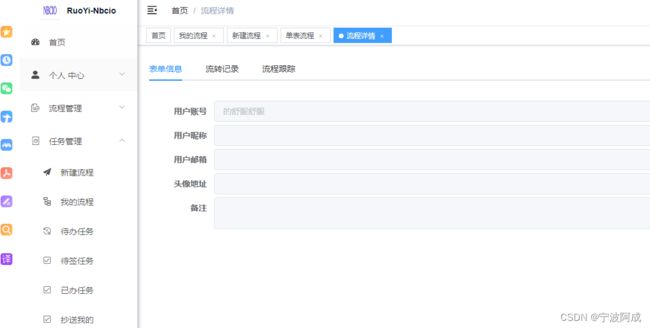基于RuoYi-Flowable-Plus的若依ruoyi-nbcio支持自定义业务表单流程(三)
更多ruoyi-nbcio功能请看演示系统
gitee源代码地址
前后端代码: https://gitee.com/nbacheng/ruoyi-nbcio
演示地址:RuoYi-Nbcio后台管理系统
相应的后端也要做一些调整
1、启动流程修改如下:
/**
* 启动流程实例
*/
private R startProcess(ProcessDefinition procDef, Map variables) {
if (ObjectUtil.isNotNull(procDef) && procDef.isSuspended()) {
throw new ServiceException("流程已被挂起,请先激活流程");
}
// 设置流程发起人Id到流程中,包括变量
String userStr = TaskUtils.getUserName();
SysUser sysUsr = sysUserService.selectUserByUserName(userStr);
setFlowVariables(sysUsr,variables);
Map variablesnew = variables;
Map usermap = new HashMap();
List userlist = new ArrayList();
boolean bparallelGateway = false;
boolean bapprovedEG = false;
//业务数据id
String dataId = variables.get("dataId").toString();
if(StringUtils.isNotEmpty(dataId)) {//自定义业务表单
//设置自定义表单dataid的数据
WfMyBusiness flowmybusiness = wfMyBusinessServiceImpl.getByDataId(variables.get("dataId").toString());
String serviceImplName = flowmybusiness.getServiceImplName();
WfCallBackServiceI flowCallBackService = (WfCallBackServiceI) SpringContextUtils.getBean(serviceImplName);
if (flowCallBackService!=null){
Object businessDataById = flowCallBackService.getBusinessDataById(variables.get("dataId").toString());
variables.put("formData",businessDataById);
}
}
//获取下个节点信息
getNextFlowInfo(procDef, variablesnew, usermap, variables, userlist);
//取出两个特殊的变量
if(variablesnew.containsKey("bparallelGateway")) {//并行网关
bparallelGateway = (boolean) variablesnew.get("bparallelGateway");
variablesnew.remove("bparallelGateway");
}
if(variablesnew.containsKey("bapprovedEG")) {//通用拒绝同意排它网关
bapprovedEG = (boolean) variablesnew.get("bapprovedEG");
variablesnew.remove("bapprovedEG");
}
// 发起流程实例
ProcessInstance processInstance = runtimeService.startProcessInstanceById(procDef.getId(), variables);
// 第一个用户任务为发起人,则自动完成任务
//wfTaskService.startFirstTask(processInstance, variables);
R result = setNextAssignee(processInstance, usermap, userlist, sysUsr, variables, bparallelGateway, bapprovedEG);
if(StringUtils.isNotEmpty(dataId)) {//自定义业务表单
// 流程发起后的自定义业务更新-需要考虑两种情况,第一个发起人审批或跳过
List tasks = taskService.createTaskQuery().processInstanceId(processInstance.getProcessInstanceId()).active().list();
/*======================todo 启动之后 回调以及关键数据保存======================*/
//如果保存数据前未调用必调的FlowCommonService.initActBusiness方法,就会有问题
LoginUser sysUser = commonService.getLoginUser();
if(tasks!=null) {
SysUser sysTaskUser = new SysUser();
List listUser = new ArrayList();
List listId = new ArrayList();
List listName = new ArrayList();
String taskUser = "";
String taskid = "";
String taskName = "";
int taskPriority = 0;
for(Task task : tasks) {
if(task.getAssignee() != null) {
sysTaskUser = commonService.getSysUserByUserName(task.getAssignee());
listUser.add(sysTaskUser.getNickName());
}
listId.add(task.getId());
listName.add(task.getName());
taskPriority = task.getPriority();
}
taskUser = listUser.stream().map(String::valueOf).collect(Collectors.joining(","));
taskid = listId.stream().map(String::valueOf).collect(Collectors.joining(","));
taskName = listName.stream().map(String::valueOf).collect(Collectors.joining(","));
WfMyBusiness business = wfMyBusinessServiceImpl.getByDataId(dataId);
business.setProcessDefinitionId(procDef.getId());
business.setProcessInstanceId(processInstance.getProcessInstanceId());
business.setActStatus(ActStatus.doing);
business.setProposer(sysUser.getUsername());
business.setTaskId(taskid);
business.setTaskName(taskName);
business.setTaskNameId(taskid);
business.setPriority(String.valueOf(taskPriority));
business.setDoneUsers("");
business.setTodoUsers(taskUser);
wfMyBusinessService.updateById(business);
//spring容器类名
String serviceImplNameafter = business.getServiceImplName();
WfCallBackServiceI flowCallBackServiceafter = (WfCallBackServiceI) SpringContextUtils.getBean(serviceImplNameafter);
// 流程处理完后,进行回调业务层
business.setValues(variables);
if (flowCallBackServiceafter!=null)flowCallBackServiceafter.afterFlowHandle(business);
}
else {
WfMyBusiness business = wfMyBusinessServiceImpl.getByDataId(dataId);
business.setProcessDefinitionId(procDef.getId());
business.setProcessInstanceId(processInstance.getProcessInstanceId());
business.setActStatus(ActStatus.pass);
business.setProposer(sysUser.getUsername());
business.setTaskId("");
business.setTaskName("");
business.setTaskNameId("");
business.setDoneUsers("");
business.setTodoUsers("");
wfMyBusinessService.updateById(business);
//spring容器类名
String serviceImplNameafter = business.getServiceImplName();
WfCallBackServiceI flowCallBackServiceafter = (WfCallBackServiceI) SpringContextUtils.getBean(serviceImplNameafter);
// 流程处理完后,进行回调业务层
business.setValues(variables);
if (flowCallBackServiceafter!=null)flowCallBackServiceafter.afterFlowHandle(business);
}
}
return result;
} 2、获取表单列表修改如下:
/**
* 获取历史流程表单信息
*/
private List processFormList(BpmnModel bpmnModel, HistoricProcessInstance historicProcIns, String dataId) {
List procFormList = new ArrayList<>();
List activityInstanceList = historyService.createHistoricActivityInstanceQuery()
.processInstanceId(historicProcIns.getId()).finished()
.activityTypes(CollUtil.newHashSet(BpmnXMLConstants.ELEMENT_EVENT_START, BpmnXMLConstants.ELEMENT_TASK_USER))
.orderByHistoricActivityInstanceStartTime().asc()
.list();
List processFormKeys = new ArrayList<>();
for (HistoricActivityInstance activityInstance : activityInstanceList) {
// 获取当前节点流程元素信息
FlowElement flowElement = ModelUtils.getFlowElementById(bpmnModel, activityInstance.getActivityId());
// 获取当前节点表单Key
String formKey = ModelUtils.getFormKey(flowElement);
if (formKey == null) {
continue;
}
boolean localScope = Convert.toBool(ModelUtils.getElementAttributeValue(flowElement, ProcessConstants.PROCESS_FORM_LOCAL_SCOPE), false);
Map variables;
if (localScope) {
// 查询任务节点参数,并转换成Map
variables = historyService.createHistoricVariableInstanceQuery()
.processInstanceId(historicProcIns.getId())
.taskId(activityInstance.getTaskId())
.list()
.stream()
.collect(Collectors.toMap(HistoricVariableInstance::getVariableName, HistoricVariableInstance::getValue));
} else {
if (processFormKeys.contains(formKey)) {
continue;
}
variables = historicProcIns.getProcessVariables();
processFormKeys.add(formKey);
}
Map formvariables = new HashedMap();
//遍历Map
if(variables.containsKey("variables")) {
formvariables = (Map)((Map) variables.get("variables")).get("formValue");
}
// 非节点表单此处查询结果可能有多条,只获取第一条信息
List formInfoList = deployFormMapper.selectVoList(new LambdaQueryWrapper()
.eq(WfDeployForm::getDeployId, historicProcIns.getDeploymentId())
.eq(WfDeployForm::getFormKey, formKey)
.eq(localScope, WfDeployForm::getNodeKey, flowElement.getId()));
//@update by Brath:避免空集合导致的NULL空指针
WfDeployFormVo formInfo = formInfoList.stream().findFirst().orElse(null);
if (ObjectUtil.isNotNull(formInfo)) {
// 旧数据 formInfo.getFormName() 为 null
String formName = Optional.ofNullable(formInfo.getFormName()).orElse(StringUtils.EMPTY);
String title = localScope ? formName.concat("(" + flowElement.getName() + ")") : formName;
FormConf formConf = JsonUtils.parseObject(formInfo.getContent(), FormConf.class);
if (null != formConf) {
//ProcessFormUtils.fillFormData(formConf, variables);
formConf.setTitle(title);
formConf.setFormValues(formvariables);
procFormList.add(formConf);
}
}
}
if(StringUtils.isNoneEmpty(dataId)) {
WfMyBusiness business = wfMyBusinessServiceImpl.getByDataId(dataId);
String serviceImplName = business.getServiceImplName();
WfCallBackServiceI flowCallBackService = (WfCallBackServiceI) SpringContextUtils.getBean(serviceImplName);
// 流程处理完后,进行回调业务层
if (flowCallBackService!=null){
Map customMap = new HashMap();
FormConf formConf = new FormConf();
Object businessDataById = flowCallBackService.getBusinessDataById(dataId);
customMap.put("formData",businessDataById);
customMap.put("routeName", business.getRouteName());
formConf.setFormValues(customMap);
procFormList.add(formConf);
}
}
return procFormList;
} 3、效果图如下:

